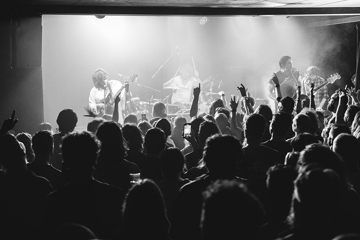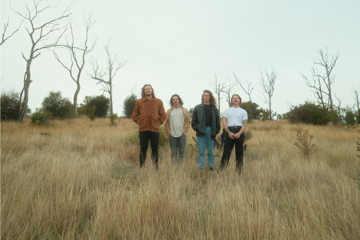On The Attack
"I used the model of Dinosaur – the new material for Dinosaur really revitalised the band."

It gets to the stage with any full-blown reunion of a seminal band where nostalgia is no longer enough to keep either the protagonists or punters coming back for more. At that juncture there's only two clear-cut options – either put the project back in mothballs or conjure with some compelling new music. The latter option is of course fraught with danger – not least the possibility of tarnishing one's 'legacy' – but the prevailing viewpoint is that a band eventually needs new tunes if they're to be seen as a relevant ongoing concern.
In the case of '90s US indie legends Sebadoh they'd survived by revisiting their former glories since reforming back in 2007 – they'd toured both different incarnations and different eras of the band – before deciding that enough was enough, eventually hitting the studio and emerging with last year's excellent eighth album, Defend Yourself (their first long-player since 1999's The Sebadoh). Fortunately founding member and co-frontman Lou Barlow had recently been through a similar process with his other reformed alma mater Dinosaur Jr, so he had firsthand experience which proved that going back to the well – if approached correctly – can indeed pay handsome dividends.
“I used the model of Dinosaur – the new material for Dinosaur really revitalised the band,” Barlow remembers. “I've been in the reincarnated, reunited version for twice as long as I was in the band originally so it worked – it's actually amazing. We just out ourselves to the challenge of making new music with Dinosaur and we just did it in a very natural way, and with Sebadoh that's what I used as the model – if we just go in and put some microphones there and record we will make a new Sebadoh record, and it will be Sebadoh. We always had our own musical identity and our own little sound, in the same way that Dinosaur does, so I knew that it could work if we just let it happen.”
Sebadoh's sound changed quite dramatically over the initial journey, and Barlow admits that they returned to these various eras as a template for the new music – namely their super-fertile mid-period, eschewing what they saw as the shortcomings of their later releases.
Don't miss a beat with our FREE daily newsletter
“I did [have an agenda for the sound] a little bit,” he continues. “With [1996's] Harmacy that was our big follow up to [1994's] Bakesale and it was meant to be our 'breakout record', but it was obvious to me at the time – I knew when we were recording it – that it would not be our breakout record. I just knew that you couldn't really take our basic thing and polish it up and make it into something more than it was, and I think it actually detracted from what we had trying to do that.
“And I actually like The Sebadoh, but that's a pretty complex and deep record – that one was also reviled. That one was really disliked among fans and was the end of an era for us, because we ended up playing shows in cities where before we'd played to hundreds of people and suddenly we were playing to a dozen people. It was a remarkable failure.
“But the new material really came from us going back and doing these shows where we were playing a lot of the stuff from Bakesale and Harmacy and [1993's] Bubble And Scrape and kind of tapping into that older energy of the band. I think when we tackled the new recordings that's what influenced it.”
As with most Sebadoh material, Barlow's contributions – he splits songwriting evenly with bandmate Jason Lowenstein – is characterised by its brutal honesty, although he attests that this approach is in his creative DNA rather than some contrived quest for catharsis.
“They're all pretty much break-up songs,” he tells of his contributions to Defend Yourself. “I don't mind them being so personal – that's what I've always done. I've embarrassed myself countless times – I don't even think about it anymore, I just do it. I'm not naming names or anything like that, but I've always done it that way and it's basically the only way I can do it because if I try to make something clever or tried to put a lot of metaphor in my songs or tried to describe something by describing something else, I wouldn't even know how to remember the words.
“Unless I'm speaking directly from my own experience and what I'm actually thinking – unless I'm speaking almost directly from that little voice in my head – then I can't remember the lyrics when I play live, and that to me is unacceptable. To me it has to be easy – it has to be natural and easy – so, especially with Sebadoh, I default to purely autobiographical, stark language.”







